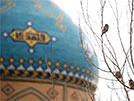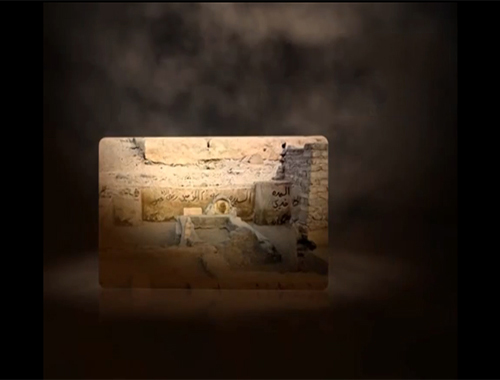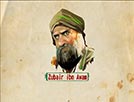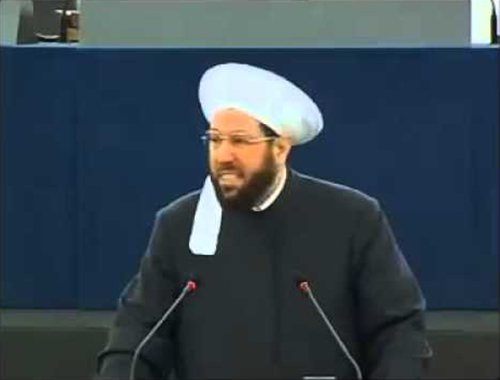Chapter 55-Principal Events of the Caliphate of Abu Bakr
- Details
- Hits: 3386
Principal Events of the Caliphate of Abu Bakr
--------------------------------------------------------------------------------
The First Civil War in Islam.
As soon as the news of the death of Muhammad Mustafa spread beyond the environs of Medina, false Prophets appeared in many parts of the country. More well-known among them were Musailama in Yamama; Tulaiha Asadi in Nejd; Laqait bin Malik in Oman; and Aswad Ansi in Yemen. Some of them wanted the government of Medina to share its authority with them, and some others wanted "autonomy" in their territories. Abu Bakr sent his troops against them which suppressed them.
Usama's Expedition
As noted earlier, the Prophet had organized, from his deathbed, a new army to attack Syria. He had appointed Usama, a lad of 18, as the general of this army, and he had placed all his companions under his command. His orders to this army were to leave Medina immediately. But the companions did not want to leave Medina, and they did not – until the Prophet died.
But after the death of the Prophet, when Abu Bakr felt secure in the seat of power, he showed great promptness in sending Usama's army to Syria. He said that one thing that he could not do, was to countermand the orders of his late master.
Abu Bakr walked with Usama's army for some distance to acquire "merits" for himself. When he thought he had acquired enough merits, he sought the General's permission to return to the city. He also requested the General to allow Umar to stay with him (with Abu Bakr) in Medina since he would need his advice in running the government.
Usama granted both requests and Abu Bakr and Umar returned to Medina.
At length Usama left Medina and marched toward the north at the head of his army minus Abu Bakr and Umar. But his army had lost its élan. He now perhaps did not know what to do, and returned to Medina after an absence of two months.
Sir John Glubb
In September 632, after two months' absence, Usama returned to Medina with plundered sheep and camels, though few details of his operations have been handed down to us. It appears that he raided Bedouin tribes rather than Byzantine troops. (The Great Arab Conquests, 1963)
Usama bin Zayd bin Haritha, the favorite of Muhammad, and the general of the expedition to Syria, appears soon to have faded out of history; very little is heard about him after he returned from his campaign. He might have taken part in the campaigns of Abu Bakr and Umar in some minor capacity.
Malik ibn Nuweira and the Massacre of his Tribe
Ibn Khalikan, the historian, says that Malik ibn Nuweira was a man of high rank in Arabia. He was a famous cavalier, a knight, a distinguished poet, and a friend of Muhammad Mustafa.
Ibn Hajar Asqalani says in his biography of the companions that when Malik accepted Islam, the Apostle of God appointed him a Revenue Officer for the tribe of Banu Yerbo. He collected taxes from his tribe, and sent them to Medina. But when he heard the news of the death of the Apostle, he stopped collecting taxes, and said to his tribesmen that before making any remittances to Medina, he wanted to know how the new government in the City of the Prophet had taken shape.
Malik did not pay taxes to the new government in Medina, and Abu Bakr sent a punitive force under the command of Khalid bin al-Walid to assert his authority, and to collect the defaulted taxes.
Khalid had a brief meeting with Malik, and the latter knew that he was going to be killed. Some historians say that Khalid was in love with Malik's wife, and he ordered his execution. Malik turned to his wife, and said: "You are the one to bring death upon me." But Khalid denied this and said: "No. You have become an apostate, and your apostasy is responsible for your death." Though Malik protested that he was a Muslim, Khalid did not listen, and the former was executed.
Abu Qatada Ansari was a companion of the Prophet. He came with Khalid from Medina. He was so shocked at Malik's murder by Khalid that he immediately returned to Medina, and told Abu Bakr that he would not serve under a commander who had killed a Muslim.
After killing Malik ibn Nuweira, Khalid "married" his widow. In Medina, Umar was so scandalized that he demanded, from Abu Bakr, the immediate dismissal of Khalid. He said that Khalid had to be put on trial for the twin crimes of murder and adultery. According to Islamic law, Khalid had to be stoned to death. But Abu Bakr defended Khalid, and said that he had simply made "an error of judgment."
The tribesmen of Banu Yerbo had withheld taxes (zakat) but apart from that they were Muslims in every sense of the term. Abu Qatada himself testified that he heard Adhan (the call to prayer) in the village of Malik, and saw his tribesmen offering congregational prayers. Even so, Khalid ordered his troops to massacre them.
Tabari writes in his History that when Khalid and his troops entered the Banu Yerbo territory, they said to the tribesmen: "We are Muslims." They said: "We are also Muslims." Khalid's men asked: "If you are Muslims, why are you bearing arms? There is no war between us. Lay down your weapons so that we may all offer our prayers."
The tribesmen put down their weapons. But no sooner they had done so, than Khalid's warriors seized them, bound them, and let them to shiver in the cold night. On the following morning, they were all put to death. Khalid then plundered their houses, captured their women and children, and brought them as prisoners of war to Medina.
Sir John Glubb
"Abu Bakr sent Khalid b. Waleed into Nejd with 4000 men. Many clans of Beni Temeem, hastened to visit Khalid but the Beni Yerboa branch of the tribe, under its chief, Malik ibn Nuweira, hung back. Malik was a chief of some distinction, a warrior, noted for his generosity and a famous poet. Bravery, generosity and poetry were the three qualities most admired among the Arabs. Unwilling perhaps to demean himself by bowing to Khalid, he ordered his followers to scatter and himself apparently moved away across the desert alone with his family. Abu Bakr had given orders that the test to be applied to suspected rebels was that they be asked to repeat the Muslim formula and that they answer the call to prayer. Khalid, however, preferred more aggressive methods and sent out parties of horsemen to round up the fugitives and plunder their property. One such party seized Malik ibn Nuweira and his family and brought them in to Khalid, although they claimed to be Muslims. The men of Medina who were with the army protested vigorously against Khalid's ruthlessness, but without avail. The prisoners were placed under guard but, during the night, Malik ibn Nuweira and his supporters were killed in cold blood. Within 24 hours Khalid had married the widow of his victim.
Malik ibn Nuweira had been executed while professing to be a believer. Indeed Khalid's marriage to the beautiful Leila gave rise to the suspicion that Malik had been killed with the object of making her available to the conqueror.
The men of Medina, who had already opposed Khalid's ruthless actions, were outraged by the death of Malik. A certain Abu Qatada, an erstwhile friend and companion of the Prophet, hastened to Medina to complain to Abu Bakr, who summoned Khalid to answer the accusation. Umar b. Khattab pressed the caliph to deprive Khalid of his command. Khalid returning to Medina, claimed that he had not ordered the execution of Malik, but that his instructions to the guards had been misunderstood. The wise Abu Bakr, whatever he may have thought of the morals of his lieutenant, was aware of his prowess. ‘I will not sheathe a sword which God has drawn for His service,' he exclaimed. Khalid's excuses were accepted." (The Great Arab Conquests, 1963, p. 112)
The tribesmen of Banu Yerbo declared that God is One, and Muhammad is His Messenger, and they said their prayers regularly. They even accepted the principle of paying Zakat, and they were paying it to the Prophet. But they withheld payment of Zakat to the government of Abu Bakr whereupon he said that they had become apostates, and declared war upon them.
Toeing the official line, the Sunni historians have bracketed all those tribesmen who withheld taxes from the Saqifa government as "apostates." Were they really apostates?
The Muslim jurists have defined "apostasy" as the repudiation of Islam. But failure to say prayers or to fast in Ramadan or to go to Makkah for pilgrimage or to pay zakat (poor tax), is not the repudiation of Islam. A man who does not carry out the mandatory duties imposed by Islam but claims that he is a Muslim, cannot be called an apostate. If one were to become an apostate for missing a prayer or a fast or payment of zakat, then many Muslims of each generation would have to be called apostates. But they are not.
There is no verse in Qur’an calling upon a Muslim government to kill those Muslims who do not pay zakat. There is no tradition of the Prophet of Islam stating that the penalty for refusal to pay zakat is death.
Far from killing the Muslims for their failure to pay zakat, the Prophet actually granted exemption from payment of taxes (zakat), at least in one case. This is what the modern Sunni historian, Dr. Muhammad Hamidullah, writes in his book, Introduction to Islam, (Kuwait, 1977):
"...a delegation from Ta'if came to Medinah offering submission. But it requested exemption from prayer, taxes and military service... The prophet consented to concede exemption from payment of taxes and rendering of military service... This act of the Prophet shows that concessions could be given to new converts..."
Here was a new precedent. The Prophet had granted exemption to the residents of Ta'if from payment of taxes. But Abu Bakr did not follow the prophetic precedent; he decided to make a precedent of his own; all men of the tribe of Malik ibn Nuweira were to be killed, and women and children to be made prisoners of war.
Besides Qur’an and Hadith, the Sunni Muslims also acknowledge the authority of "consensus." In fact, consensus in Sunni jurisprudence is such an important principle that it is rated as something almost infallible. There was consensus of all companions including Umar himself in opposing Abu Bakr's decision to fight against those Muslims who had not paid taxes. But Abu Bakr overrode their consensus and said that if the tribes withheld even that piece of rope with which they tied a calf, out of the share of zakat, he would fight against them, and would take it from them. His orders to his troops were categorical: Exterminate all those people who do not pay zakat.
Abu Bakr's troops carried out his orders. They subjected the Muslim tribesmen to unspeakable horrors, and committed acts of supreme cruelty upon them for withholding the poor-tax.
The so-called "wars of apostasy" fought in the caliphate of Abu Bakr, were actually a civil war – the first in Islam. These wars were fought by Muslims against Muslims – the casus belli in their case being the refusal of some tribes to pay the poor-tax to the government of Abu Bakr.
Abu Bakr began his reign with a civil war but he called it a war of apostasy. When a civil war was given the name of a war of apostasy, it became "respectable" and "holy," and it became the duty of all Muslims to participate in it.
In their anxiety to defend Khalid, many Muslims blandly assert that after the death of the Prophet, Malik and his tribe had become apostates, and the penalty prescribed in Islam for apostasy is death. If their reason for defending Khalid is that he was a companion of the Prophet, then Malik was also a companion of the Prophet. Companionship of the Prophet, therefore, cannot be their reason for defending Khalid. There must be some other reason or reasons. Actually they defended Khalid because he was an instrument of the policy of the Saqifa government. Malik ran afoul of the Saqifa government when he withheld taxes from it. Apart from this, he and his tribesmen were practicing Muslims. But for their "indiscretion" they paid a frightful penalty – they were extirpated!
In the face of overwhelming evidence against Khalid, Abu Bakr was compelled to arraign him but as a grateful master, he defended him, and attributed his crimes to a minor "error of judgment." As a reward for his quickfix exploit, he bestowed upon him the title of "the sword of God," and one year later, when the whole peninsula came under his control, he (Abu Bakr) appointed him (Khalid) the supreme commander of his armies in Syria.
Such offenses as adultery and the mass murder of Muslims could not only be overlooked as minor "errors of judgment," but could actually be rewarded if their authors lent their blind support to the government of Saqifa.
The "error of judgment" syllogism proved to be a serendipitous discovery for many Muslims. It enabled them to rationalize every crime, and to defend every criminal. In the years to come, they drew a veil over some of the most ghastly acts and egregious deeds in the history of Islam with the explanation that they were only "errors of judgment."
Here one can see an interesting case of the application of the proverbial double-standard. In the caliphate of Abu Bakr, all those Muslims who had withheld the poor-tax, were denounced by him and by the Sunni historians as "apostates," and were put to the sword. But in the caliphate of Ali ibn Abi Talib, all those people who rose in rebellion against the lawfully constituted authority, and who caused the death of tens of thousands of Muslims, were exonerated and exculpated because they had committed merely an "error of judgment," and they had "repented."
The "error of judgment" was a remarkably expansive blanket!
As noted above, Abu Bakr inaugurated his caliphate with a civil war. But he was able to disguise it as a war of apostasy, and by resolute action, succeeded in crushing all opposition to himself.
Other Conquests of Abu Bakr
The Apostle of God had appointed one Ziad bin Labeed as governor of Hadrmaut and Kinda. When he died, a certain Ash'ath bin Qays rose in rebellion against the government of Medina which now was headed by Abu Bakr. The latter sent his general, Ikrima bin Abu Jahl, to restore his authority in South Arabia. Ikrima defeated Ash'ath, captured him and sent him as a prisoner to Medina. Ash'ath asked for pardon. Abu Bakr not only pardoned him but also gave his sister in marriage to him.
In Bahrain, the tribes of Banu Bakr and Banu Abdul-Qays had refused to pay taxes. Punitive action was taken against them, and they were compelled to pay their taxes.
These campaigns are known in history by the generic name of the "Ridda" wars.
Abu Bakr spent full one year in fighting against the Ahl-er-Ridda and the false Prophets. At year's end all of them had been reduced to submission, and his authority was established in the country. However, at the successful termination of these campaigns, he did not want his troops to be idle; he sent them to invade the neighboring countries of Syria and Persia.
John Alden Williams
"When Abu Bakr was done with the case of those who apostatized, he saw fit to direct his troops against Syria. To this effect, he wrote to the people of Mecca, al-Taif, al-Yaman, and all the Arabs in Nejd and al-Hijaz calling them for a holy war and arousing their desire in it and in the obtainable booty from the Greeks (Byzantines). Accordingly, people including those actuated by greed as well as those (in) hope of divine remuneration, flocked to al-Madina. It is reported on the authority of al-Waqidi that Abu Bakr assigned Amr (ibn al-Aas) to Palestine; Shurahbil (ibn Hasana) and Yazid (ibn Abu Sofyan) to Damascus." (Themes of Islamic Civilization, 1971)
The campaigns against Syria and Persia were begun by Abu Bakr but he died before he could conclude them. They were brought to a successful conclusion by his successor, Umar bin al-Khattab.
Seizure by Abu Bakr of the Estate of Fadak
Fadak was one of the estates acquired by the Prophet of Islam after the conquest of Khyber in 7 A.H. But since his troops did not have to fight for it, and it was surrendered voluntarily to him, it was considered to be the property of God and His Messenger.
As noted before, the Messenger of God made Fadak a gift to his daughter, partly as a recompense for the great sacrifices her mother, Khadija, had made for Islam.
When Abu Bakr took charge of the government of the Muslims, one of his first acts was to take forcible possession of Fadak. He evicted the agents of Fatima Zahra from her estate, and he also confiscated the property her father had given her in Medina itself.
When Fatima Zahra protested against these seizures, Abu Bakr answered her with a "tradition" of her father. He said that he had heard the Apostle of God saying that the apostles do not have any heirs, and such wealth, property or material goods as they possess in their lifetime, belong, after their death, not to their children, but to the umma (the people).
Fatima said that Fadak was not a bequest of her father; it was a gift. She claimed that Fadak was the private property of the Apostle of God, and it was as his private property that he had given it to her.
Abu Bakr asked if there were any witnesses.
This was truly fantastic. Only four years had passed since the conquest of Khyber. Abu Bakr was not only present at the siege but had also made an abortive attempt to capture the fortress. He had seen with his own eyes what the Apostle had done with Fadak. Now four years later, he was acting as if he did not know anything. According to Bukhari, the collector of Hadith, the following dialogue took place between the plaintiff and the defendant.
Fatima: O Abu Bakr, if your father dies, who will be his heir?
Abu Bakr: I, who am his son.
Fatima: Who is the heir of my father?
Abu Bakr: You, his daughter.
Fatima: If I am his heir, then why have you seized Fadak?
Abu Bakr: I have heard the Apostle of God saying: "We are the group of Prophets, and we do not have any heirs to inherit our property. Whatever property we have, belongs to the umma when we die."
Fatima: But my father bestowed Fadak upon me as a gift during his lifetime, and it has been in my possession all these years.
Abu Bakr: Do you have any witnesses?
Fatima: Ali and Umm Ayman are my witnesses.
Abu Bakr: The testimony of one man and one woman is not enough. There must beeither two men or one man and two women. But since it is not so, the case is dismissed.
The ears Fatima was addressing, were not willing to listen to any argument or reason. The witnesses would have made no difference to those who were resolved not to be convinced. The accused party had one very conclusive argument in its favor, viz., Brute Force! It was an argument that had the power to silence every other argument, and it did.
To support his action in seizing the estate of Fadak, Abu Bakr quoted a "tradition" of the Apostle of God. But it is strange that he alone heard this "tradition." And it's just as strange that Muhammad did not tell members of his own family that they would not inherit his property after his death because he was God's messenger, but he went around whispering "traditions" into the ears of outsiders.
Abu Bakr is the only man in the umma of Muhammad who reported this "tradition" and who set it against the authority of Al-Qur’an al-Majid.
The verdict of Qur’an is as follows:
From what is left by parents and those nearest related there is a share for men and a share for women, whether the property be small or large, – a determinate share. (Chapter 4; verse 7)
To benefit every one, We have appointed sharers and heirs to property left by parents and relatives. To those, also, to whom your right hand was pledged, give their due portion. For truly God is Witness to all things. (Chapter 4; verse 33)
According to these verses, God has given the children the right to inherit the property left by their parents. Is there any other verse which denies this right to the children of the messengers of God, specifically, to the daughter of Muhammad?
Even if it is assumed that the "tradition" quoted by Abu Bakr is not spurious, and the heirs of Prophets cannot inherit their property, then this "law" ought to apply to the children of all the Prophets, and not just to the daughter of Muhammad. But according to Qur’an, the Prophets of the past had their heirs, and those heirs inherited the property left by their Prophet – fathers.
And Solomon was David's heir. (Chapter 27; verse 16)
Translator's Note to this verse
The point is that Solomon not only inherited his father's kingdom but his spiritual insight and the prophetic office, which do not necessarily go from father to son. A. Yusuf Ali)
At any rate, it was not necessary for Fatima Zahra to bring witnesses. She was already in possession of Fadak. Her ownership of Fadak rested upon a solemn decree or pragmatic sanction of Muhammad Mustafa as the Messenger of God and the Sovereign of all Muslims, and could not be lawfully challenged. The burden of proof that Fatima's possession of the estate was illegal, was on Abu Bakr.
An important point is that the judiciary should be separate from the executive, and the executive should not interfere with the judiciary. But in the case of Fadak, Abu Bakr who was the accused party, was himself the judge and the jury, and his verdict inevitably went against the plaintiff as it would have done in any kangaroo court or star chamber.
The seizure of Fadak was a highly arbitrary act. Not long after Fadak, Abu Bakr was confronted with many new and complex problems. To solve them, he set two important precedents. One was the appointment of the companions as judges. For these positions, he selected men who were noted for their knowledge and sound judgment. If he had been fair, he ought to have referred the case of Fadak to one of his judges for adjudication instead of taking unilateral action on it by seizing it.
The second precedent was consultation with the companions. If Abu Bakr had a difficult problem, he sat in the mosque, summoned the leading companions, and put it before them. After some deliberation, they solved the problem. If Abu Bakr had been fair, he ought to have requested them to give their impartial judgment on Fadak. But he did not do so.
The "tradition" which Abu Bakr quoted as his "reason" for taking possession of Fadak, was actually an ad hoc juridical formulation designed to meet a situation which threatened to compromise his position. It was a "principle" invoked for the first and the last time. Once the crisis had passed, it was given a burial, never again to be exhumed.
In her legal confrontation with the government of Saqifa, over the seizure of Fadak, Fatima Zahra hardly expected any justice. The death of her father, naturally, was the greatest shock and greatest sorrow for her. But some of his companions didn't think that her sorrow was great enough, and they sought to make their own "contribution" to it. It was just when she was in the midst of mourning for her father that Abu Bakr evicted her estate manager from Fadak, and his agents took possession of it.
A long time after the plaintiff and the defendants in the case of the estate of Fadak had left this world, Umar bin Abdul Aziz, the Umayyad caliph, restored it to the heirs of Fatima Zahra. He was pious and God-fearing, and realized that the seizure of Fadak had been an wanton act and an outright usurpation.
The action of the Saqifa government in seizing Fadak had little to do with law or its interpretation. Its leaders were inspired by a single aim, viz., to deprive the children of Muhammad Mustafa of their means of living. Sadaqa was unlawful for them, and they could not accept it. The property which he gave them, was confiscated from them, and their right of inheritance was not recognized.
Ali's Retirement from Public life
After these revolutions, Ali spent most of his time at home where he occupied himself with the task of collecting the verses of Qur’an, and in arranging them in their chronological order. He was thus demonstrating that his duty was to serve Islam regardless of the extraneous circumstances. He often quoted, before his friends, the tradition of the Prophet that the members of his family and Qur’an were his "legacy" to the Muslim umma, and that both of them were inseparable from each other.
No one among the companions was better qualified than Ali to collect the verses of Qur’an. He was one of the few companions of the Prophet who knew Qur’an by heart. Incidentally, Umar bin al-Khattab had spent fourteen years trying to memorize the second chapter of Qur’an (Al-Baqarah), but was unable.
Collecting all the scattered verses of Qur’an in the same order in which they were revealed, was a job that could be done by someone especially tutored by Muhammad Mustafa himself. Such a person was Ali. He had spent more time with him than anyone else. He had literally grown up with Qur’an. He himself said that there was not a verse in Qur’an about which he did not know when it was revealed, where it was revealed, and why it was revealed. He had the knowledge of the time, the place and the occasion of the revelation of every single verse of Qur’an.
Ali completed the self-imposed task. But unfortunately for Islam, the party in power, in line with its policy, did not want to give recognition to his work. Nothing was more unwelcome to it than to acknowledge Ali's services to Islam. It did not, therefore, "accept" his collection of the verses of Qur’an.
In the days immediately following the death of the Apostle, many people came to see Ali, and some of them counseled him to seize by force what was his by right. Among these people there were a few sincere friends, and also there were many unscrupulous opportunists. They all offered him their support. The latter, of course, offered their support for ulterior reasons. They hoped to kindle war in Islam and to profit by the infighting of the Muslims.
Immediately after the death of the Prophet, his uncle, Abbas ibn Abdul Muttalib, called on Ali, and said: "Hold out your hand, and I will give you my pledge of allegiance. This gesture of mine will have a great psychological effect upon the Muslims. They would say that the uncle of the Prophet has given his pledge of loyalty to Ali; we too, therefore, should give him our pledge."
Abbas, of course, was one of the few sincere friends. In another category of Ali's "well-wishers" was Abu Sufyan, the leader of the Banu Umayya, the life-long antagonist of Muhammad, and the symbol of the pagan opposition to and hatred of Islam. In the events following the death of the Prophet, he perceived his opportunity to subvert Islam, and he seized it. He came to Ali and said: "It is outrageous to see men of the humblest clans of Quraysh usurping your right, and capturing the government which is yours. All you have to do to take it from them, is to give me the signal, and I shall fill the streets of Medina with infantry and cavalry, ready to die at your command."
What mortal could have resisted this offer? And what did Ali have to lose now anyway? What he could lose, he had lost. But then who in the Muslim umma loved Islam more than he did? He never allowed temptation or provocation to make him do anything that would militate against the broader interests of Islam and the Muslims. Islam was still a highly fragile achievement quite capable of being aborted and corrupted by forces inside and outside Medina but in Ali it had a protector who did not let it happen.
If Ali was "the best judge in Islam," he was also the best judge of men. His reply to Abu Sufyan, framed as a question, was characteristic. "Since when you have become a well-wisher of Islam?" asked Ali. It was only a rhetorical question, and with it he spurned Abu Sufyan's offer with the contempt that it deserved, and squelched him.
With this answer, Ali demonstrated once again that he and he alone was the true guardian of Islam. In this fateful moment, he forswore his own interests and ambitions but he saved Islam from shipwreck.
It was a truly critical time in the history of nascent Islam. Rebellions against the government of Abu Bakr were breaking out all over the country. If Ali had accepted the offers of his uncle, Abbas ibn Abdul Muttalib, and of Abu Sufyan, he might have succeeded in capturing the government of Medina. But his success would have come only at a cost, to Islam, of a civil war in Medina which was the core of the Muslim state and society. War in Medina at this juncture might have brought the career of Islam to an abrupt end.
Ali passed this test as he had passed many others in life. He did not yield to temptation.
The Society of Cincinnati, formed at the close of the American Revolution by officers who served with Washington, has long maintained ties with those descendants of French officers who served the American cause. The English translation of the Society's motto is: "He relinquished everything to save the nation."
Perhaps even more appropriate would be a motto designed for Ali ibn Abi Talib which might read:
"He relinquished everything to save Islam."
The Death of Fatima Zahra
Ali had sustained two terrible shocks in one day; the first was the death of his friend and benefactor, Muhammad, the Apostle of God. The Apostle's death had put an emphatic end to Ali's and his family's happiness and welfare in this world. The second was the usurpation of his right of succession. The companions had taken caliphate out of his house, and had appropriated it for themselves.
Ali was trying to recover from these two shocks when a third shock came, just as devastating as the first two. About seventy five or ninety five days after the death of the Apostle of God, his beloved daughter, and Ali's wife – Fatima Zahra – also died. Ali was overwhelmed by sorrow at her death. Fatima Zahra was given burial at night, as per her own request. Only the family members knew about her burial and the site of burial. The people of Medina did not know when and where she was buried.
After the death of her father, Fatima Zahra wished nothing more than to be reunited with him in Heaven. Her death was hastened, rather caused, by the series of shocks which came like waves, one after another, following the death of her father. Most of the companions of her father had not attended his funeral; from her funeral they were purposely excluded. She met her father in Heaven, and she found the happiness which had eluded her since his death, once again.
Ali was only 32 years old when the Apostle of God and his daughter died. But after their death, the time still left to him, was like twilight years in which he tried to drown his sorrows in devotion to God and in service to Islam. Notwithstanding his differences and disagreements with the rulers of the times, he never adopted an obstructionist policy. He was ever ready to serve the Muslims. Everything he ever said or did, was calculated to strengthen Islam or to benefit the Muslims. Ali demonstrated over and over again that his love and his hatred, his friendship and his animosity, were for God and for God alone. His attitude toward personalities was invariably impersonal. His love and his hatred were equally impersonal. He loved and he hated – only for the sake of God. He loved those who loved God, and he hated those who disobeyed God.
Abu Bakr's Policy
Abu Bakr and Umar knew that the Arabs had two obsessions: love of plunder and vindictiveness. They skillfully used both these obsessions. They gave the Arabs a taste of plunder by denouncing those Muslims as apostates who had withheld the payment of taxes to their government. Once the latter were branded as apostates, it became lawful to kill them, to plunder their homes, and to enslave their women and children.
But the eradication of "apostasy" was a small-scale and local affair. To solve their long-term problems, Abu Bakr and Umar hit upon a bolder plan of action. They did not let the victors of the skirmishes and the battles of apostasy return to Medina. Instead, they ordered them to march upon the frontiers of Syria and Persia, and to invade those countries simultaneously. This decision was a stroke of political genius as events were soon to show.
Noldeke
It was certainly good policy to turn the recently subdued tribes of the wilderness towards an external aim in which they might at once satisfy their lust for booty on a grand scale, maintain their warlike feeling and strengthen themselves in their attachment to the new faith. (from the Sketches from Eastern History)
Noldeke would be more correct if he were to modify his statement to read that the tribes "might strengthen themselves in their attachment to the new government of Saqifa," instead of the "new faith." Faith is not strengthened by killing other people and by plundering their homes and cities. But the tribes were certainly strengthened in their attachment to the government of Saqifa which gave them most splendid opportunities to "satisfy their lust for booty on a grand scale."
Geoffrey Blainey
Professor Quincy Wright, who completed in Chicago in 1942 an ambitious study of war, concluded that a major and frequent cause of international war was the aggressive tendency "to indulge in foreign war as a diversion from domestic ills." Wright's argument is more forceful in the current edition of the Encyclopedia Britannia, for which he wrote the article on causes of war: he doubted whether a totalitarian dictatorship could exist without taunting or attacking a foreign scapegoat. (The Causes of War, New York, 1973)
Sir Basil H. Liddell Hart
Dictators make war on some other state as a means of diverting attention from internal conditions and allowing discontent to explode outward. (Why Don't We Learn From History? 1971)
When the Muslim armies attacked the outposts at the frontiers of the Roman and the Persian empires, their discontent exploded outward.
Professor James M. Buchanan
"We must beware the shades of Orwell's ‘1984,' when external enemies are created, real or imaginary, for the purpose of sustaining domestic moral support for the national government." (Quoted by Leonard Silk in the New York Times, October 24, 1986)
A modern Pakistani historian, Dr. Hamid-ud-Din, says that Abu Bakr had very strong reasons for attacking Persia and Rome. In his History he writes:
The Arabs were united under the banner of Islam, and the Persians considered them a perennial danger. The Christian Arab tribes of Iraq often instigated the Persians against the (Muslim) Arabs. (Iraq in those days was part of the Persian Empire). But the Persians were unable to give any attention to the Arabs because of their own civil wars which had ruined their country. Nevertheless, Abu Bakr was convinced that if internal peace returned to Persia, the Persians would attack the Arabs. He was, therefore, always cautious, and never overlooked the principle of "safety first." Skirmishes had already begun between the nomads of Iraq and the Muslim tribe of Wael. Mathanna bin al-Harith, chief of the Wael, went to Medina and sought permission from Abu Bakr to attack Iraq. Khalid bin al-Walid had recently been freed from the campaigns against the apostates in Central Arabia which he had successfully terminated. Abu Bakr appointed him as second-in-command to Mathanna. (History of Islam by Hamid-ud-Din, Ph.D. [Harvard University], Lahore, Pakistan, 1971)
Abu Bakr, apparently, had equally strong reasons for attacking the Romans. Dr. Hamid-ud-Din further writes in his History:
Just like the Persians, the Romans were also afraid of the newly consolidated government of the Arabs. They considered it a threat to themselves. There was, therefore, always the danger of an attack by them on Medina. Abu Bakr was never unmindful of this threat. Therefore, he sent an officer, one Khalid bin Saeed, at the head of a company of soldiers, for the surveillance and reconnaissance of the Roman frontier. It appears that this Khalid was "provoked" into attacking the Romans.
Abu Bakr's generals "pacified" Arabia, collected poor-tax from the tribes which had not paid them earlier, and when nothing was left for them to do at home, they made the first tentative excursions into the Persian and Byzantine (Roman) territory. Minor successes were followed by major victories. A steady stream of gold and silver, of women and slaves, began to pour into Medina. The Muhajireen and the Ansar forgot their debates of right and wrong. They also forgot their mutual jealousies and suspicions. The campaigns in Persia and Syria consolidated the Saqifa government in Medina.
The Aims of the Wars of Abu Bakr and Umar
1. To silence the critics of the Saqifa government, and to put an end to interrogations of all kinds.
2. To convince the Muslims that the policies of the Saqifa government were inspired by true religious zeal.
3. To give the Arabs an opportunity to gratify their lust for plunder. The theory was that once the Arabs tasted the pleasures of conquest and plunder, they would have little time or inclination to ponder moral, ethical or philosophical questions. Their self-interest would take precedence over everything else.
4. To assure the security of the government of Saqifa by all means. Its leaders figured that in the tumult of war and conquest, the Arabs would gradually forget the family of their Prophet, and this would be their real triumph.
5. To give an opportunity to the enemies of the family of Muhammad Mustafa to rise to high positions so that they would buttress the Saqifa power structure.
Though Ali had never challenged Abu Bakr and Umar, they saw his mere presence as a "threat" to their security. To make themselves "secure" they believed that they had to find a new base of power. This they readily found in the family of Abu Sufyan and the other Umayyads of Makkah, and they forged an alliance with them.
Sir John Glubb
The three column commanders (of Abu Bakr in the Syrian campaign) were Amr bin Aas, Shurahbil bin Hasana, and Yezeed bin Abu Sufyan (his father, old Abu Sufyan, the victor of Ohod, and Mohammed's old opponent, had meanwhile been shelved by being given a governorship in the Yemen.(The Great Arab Conquests. 1963)
The Saqifa government appointed Abu Sufyan its governor in Yemen, and his eldest son, Yazid, its general in the Syrian campaign. Yazid's younger brother, Muawiya, was appointed a staff officer, and he accompanied him to Syria.
New possibilities were created for the all but moribund Umayyads, and from their total obscurity in the time of Muhammad Mustafa, they suddenly vaulted to top ranks in the time of Abu Bakr.
Abu Bakr and Umar, both exhibited a powerful tropism toward the Umayyads throughout their reigns. They might have done this for insuring party dominance and integrity. Abu Bakr, it appears, was much impressed by Abu Sufyan and his children. M. Shibli, the historian, has recorded the following incident in his Life of the Prophet:
In the sight of Muhammad, rich and poor, master and slave, white and black, were all equal. Salman, Sohaib and Bilal, all three had been slaves at one time but in his sight, they were in no way inferior to the chiefs of the Quraysh.
One day Salman and Bilal were going somewhere when they came across Abu Sufyan and Abu Bakr. Salman or Bilal (one of the two) said: "Why the edge of the sword has not found the neck of this enemy of God yet?"
Abu Bakr was horrified to hear this remark, and said: "How do you dare to use such language for the lord of the Quraysh?" He then immediately went to see the Prophet and complained to him about what he had heard. But the Prophet said: "I hope that you have not made Salman and Bilal angry. If you have made them angry, then you have made God angry."
Abu Bakr went back to Salman and Bilal, and asked them: "Are you angry with me?" They said: "No. May God forgive you." (Life of the Prophet, Vol. II, Azamgarh, India, 1974)
Dr. Hamid-ud-Din
When Muhammad died, Abu Bakr became khalifa. Abu Bakr was highly conscious of the high status of the Umayyads, and he was very mindful of their honor and glory. He appointed Yazid, the son of Abu Sufyan, the general of an army. At this time, the Umayyads performed such great deeds for the sake of Islam that the people forgot their past hostility to Islam. When Damascus was conquered, Umar bin al-Khattab (who had succeeded Abu Bakr as khalifa) appointed Yazid bin Abu Sufyan its governor. When Yazid died, he (Umar) appointed Muawiya (Yazid's younger brother), as the new governor of Damascus. (History of Islam, Lahore, Pakistan, 1971)
In this appraisal, the historian has interjected a purely subjective note. What great deeds did the Umayyads perform "for the sake of Islam" during the caliphate of Abu Bakr or even of Umar? The Umayyads performed great deeds, i.e., they conquered new lands, but much later, and not for the sake of Islam but for their own sake. And who were the people who forgot the past hostility of the Umayyads to Islam? The people who were the first to forget the Umayyad hostility to Islam were none other than Abu Bakr and Umar themselves!
The alliance of Abu Bakr and Umar with the family of Abu Sufyan and the Umayyads against the family of Muhammad and the Banu Hashim was permanent and unbreakable.
As the spiritual heirs and the "instruments" of the policy of Abu Bakr and Umar, the Umayyads served a period of "apprenticeship" at the end of which they were ready to claim and to receive their reward. Their reward was the government of Saqifa itself!
This is the story of the rise of the Umayyads to power. It was in this manner that in the words of Gibbon, "the champions of idolatry became the supreme heads of his (Mohammed's) religion and empire," –one of history's most consummate touches of irony.
Abu Bakr's sickness and death
In 13 A.H. (A.D. 634) Abu Bakr fell ill, and when he sensed that he was going to die, he bethought of appointing his own successor.
Abu Bakr called his secretary, Uthman bin Affan, to write his will. When the latter came, he sat up in his bed, and began to dictate to him as follows:
"In the name of God Who is Most Merciful and Beneficent. I, Abu Bakr, successor of the Apostle of God..."
Abu Bakr had gone only as far as this when he had a fainting spell and he lost consciousness. While he was still unconscious, Uthman, his secretary, himself added the words:
"appoint Umar as my successor and your ruler."
When Abu Bakr recovered consciousness, he asked Uthman to read what he had written, and he read:
"I, Abu Bakr, successor of the Apostle of God, appoint Umar as my successor and your ruler."
When Abu Bakr heard this, he was immensely pleased with Uthman. He gave him his blessings, and then went ahead with the rest of the dictation. (Tabari – History, Vol. 4, page 52)
Uthman had no way of knowing if Abu Bakr would ever regain consciousness and would complete the dictation of his will. On his part, he (Uthman) had already forged a document, and he and some others were going to foist it upon the umma – the umma of Muhammad – as Abu Bakr's will and testament!
Though Abu Bakr had many other fainting spells when he was dictating his will, Umar did not shout that he (Abu Bakr) was delirious and was talking nonsense. It was the same Umar who had refused to let the Apostle of God dictate his will even though the latter did not faint, and did not lose consciousness at any time.
Umar took Abu Bakr's will in his hand, and went around asking people to obey what the khalifa of the Prophet had written in it.
Abu Bakr's election and democracy
Many historians claim that Abu Bakr's election was governed by democratic principles. But such a claim cannot be sustained on the following grounds:
1. When Muhammad Mustafa died, most of the Arabs had accepted Islam. According to the principles of democracy, all of them ought to have taken part in the election of their leader. But if it was not possible to do so, then the chiefs of all the tribes ought to have been consulted in the matter. But if this also was not possible, then the successor of the Prophet ought to have been chosen in his Mosque, in an assembly of all the Muhajireen and the Ansar who were present in Medina. This, very definitely, was possible.
But none of these methods was adopted. What actually happened was that some members of the two tribes of the Ansar, viz., the Aus and the Khazraj, gathered in Saqifa to select their own chief. The spies of Abu Bakr and Umar informed them about the assembly of the Ansar, and they went running to it. On their way they took Abu Obaida ibn al-Jarrah along with them.
Abu Bakr and Umar are touted to be great champions of democracy. If they were, they ought to have told the Ansar to dissolve their meeting in Saqifa, and then to reassemble in the Great Mosque to elect a leader in the presence of all the Muhajireen and all the Ansar. But they did not.
2. Abu Bakr and Umar, in their speeches in Saqifa, acknowledged the services of the Ansar to Islam, but added: "The government which you are eager to seize, was created by Muhammad. Now that he is dead, it should belong only to his heirs, and not to you. We are his heirs. We are Qurayshites same as he was."
In democracy, a basic rule is that a candidate for office runs in an election on the strength of his personal qualifications. He must be qualified by ability, experience and integrity etc. He does not claim that he is running for office and ought to be elected because he is related to an erstwhile head of state. Yet Abu Bakr told the Ansar that he had a better claim to leadership than they had because he was nearer to the Prophet than they were.
3. In the matter of appointing Umar as his successor, Abu Bakr did not go through the motions of the farce of an election. He went ahead and arbitrarily declared Umar as the next khalifa.
The Sunni Muslims claim that Muhammad, the Messenger of God, did not appoint his own successor, and left his (the successor's) choice to the umma. But Abu Bakr appointed his own successor, and in doing so, he deviated from the practice of the Prophet. If it was a tradition of the Prophet not to appoint his own successor, then Abu Bakr defied it by appointing his own successor. He also defied, at the same time, a tradition of democracy.
Abu Bakr was not alone in repudiating democracy by his deeds. The man most responsible for his (Abu Bakr's) election, viz., Umar bin al-Khattab, himself denounced it. He warned Muslims not to try to find a leader through election again, and said that God had saved them from the pernicious effect of this mode of finding a leader in the case of Abu Bakr.
Abu Bakr died in August 634, and was buried by the side of the Prophet of Islam in his tomb.


![take advantage of your [present] time](/en/media/com_hwdmediashare/files/99/f5/fb/5293162f4d04afb1ed8da3034e984340.jpg)








